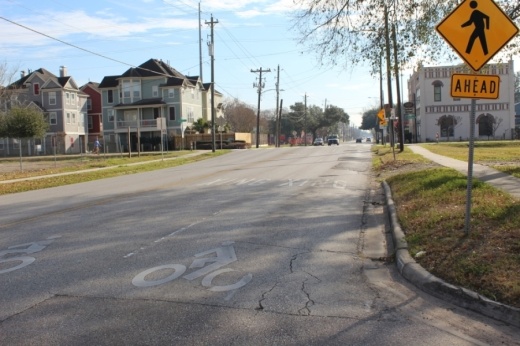Following a previous announcement from Houston Mayor Sylvester Turner on a proposed 11th Street Bikeway project in the Heights, Turner announced his decision to allow the project to move forward on June 14.
Turner decided to take “ownership” of the project after hearing multiple residents from the Heights come forward at Houston City Council public sessions with concerns regarding the scope of the project.
As previously reported by Community Impact Newspaper, the project will make improvements along a 1.5-mile stretch of 11th Street from Shepherd Drive to Michaux Street as well as on Michaux from 11th Street south to Stude Park. The project will reduce the number of lanes through what is called a “road diet” and implement new protected bike lanes.
Despite pushback from some community members, others have come out in support of the project, as has the cycling advocacy group Bike Houston.
The 11th Street Bikeway project is a part of Turner’s Vision Zero—a commitment to end traffic deaths and serious injuries in Houston by 2030. According to the city’s Feb. 7 presentation, the city wants to address dangerous speeds seen on the road, where vehicle speeds average 38.5 mph despite the 30 mph speed limit.
According to the presentation, the project will also address a problem with crashes. The Texas average for undivided roads of four or more lanes—the current configuration of 11th Street—is 356, while the average on 11th Street from Shepherd to Heights is 385.
In his announcement video, Turner said the street encourages fast driving, with crashes at every intersection between Michaux and Shepherd.
“11th Street is not safe for the neighborhood, and it definitely does not match the Heights character,” Turner said.
He said this announcement comes after three years of 10 community meetings, work with council members, analysis, designs and redesigns based on community feedback, and different letters of support from the Greater Heights Super Neighborhood Council and the Woodland Heights Civic Association.
Turner also said he directly reviewed the project and visited 11th Street at two different times of the day to experience the street during the middle of the day and during rush hour.
“The project will make 11th Street and the Heights overall a safer place to walk, to bike and to drive,” Turner said. “It will remind everyone that the Heights is a neighborhood for families. It will help 11th Street be more than a street. It will be a place people remember.”
According to a group known as the Alliance for Reasonable Traffic Solutions—a group made up of residents who are against the project—the street already meets Vision Zero requirements, with crashes being concentrated primarily at three intersections: Yale Street, Heights Boulevard and Studewood.
Officials with the ARTS said they would rather see targeted improvements at key intersections instead of revamping the entire roadway. They have also called on officials to consider finishing bikeways on 14th Street and putting a bikeway on 19th Street instead of 11th.
Opponents said they believe the plan will lead to fewer customers for businesses and could also result in more traffic conflict for bicyclists from cars entering and exiting driveways on 11th.
Other concerns include the effects of narrowing 11th on delivery trucks and the potential for cars to resort to neighborhood side streets to get around if congestion worsens, increasing risk to pedestrians on those streets.
Despite the fight against 11th Street, Stacey Seals, a member of the ARTS and longtime Heights resident, emphasized the group is not opposed to bike lanes.
According to a statement from ARTS, they are disappointed in this decision, and stand firm in their beliefs that 11th Street is not a good candidate for the road diet.
"We have requested a public hearing of the project and an audit of work done by the Transportation Planning Division on the 11th Street Project, yet our pleas have been ignored," the statement said. "We will monitor the project and the impact on businesses and residents, and will continue to let our voice be heard--loud and clear."
Turner said the city will continue to monitor the area once the project is completed to see if traffic goes to neighborhood streets. If the data shows cut-through traffic is an issue, he said they will have treatment budgeted to fix it.
“This change isn’t easy and won’t satisfy everyone,” Turner said. “I stand with the whole Heights community. Together, we will make 11th Street safer for all and give the Heights a little bit of that small town feel back again.”





